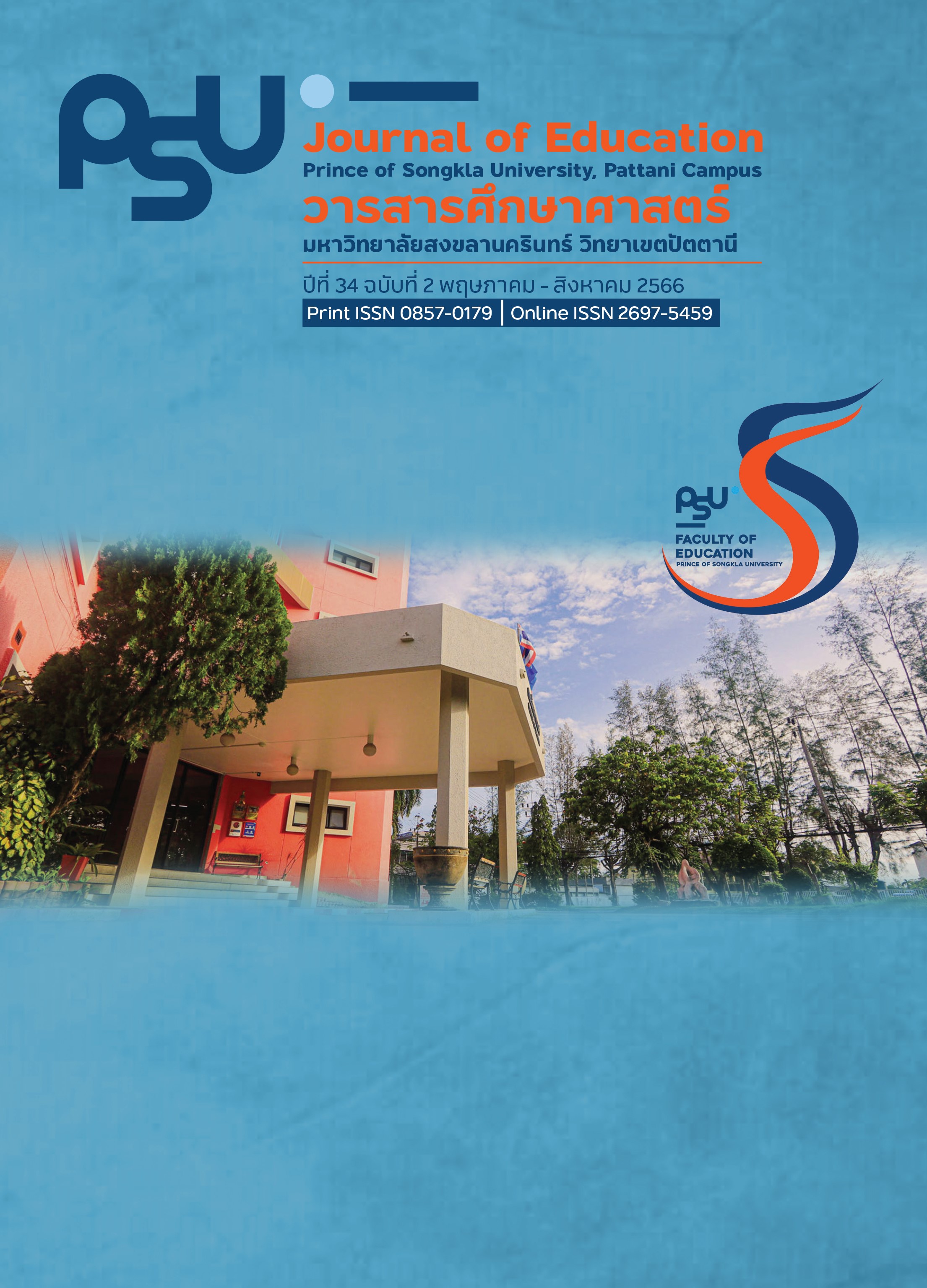ผลการจัดกิจกรรมการเรียนรู้วิทยาศาสตร์โดยใช้โครงงานเป็นฐาน เพื่อส่งเสริมการรู้เรื่องวิทยาศาสตร์และทักษะการเรียนรู้ในศตวรรษที่ 21 ตามแนวคิด Connectivism
Main Article Content
บทคัดย่อ
การวิจัยนี้มีวัตถุประสงค์เพื่อ 1) ศึกษาผลการจัดกิจกรรมการเรียนรู้วิทยาศาสตร์โดยใช้โครงงานเป็นฐานตามแนวคิด Connectivism เพื่อส่งเสริมการรู้เรื่องวิทยาศาสตร์ (Scientific literacy) ของนักเรียนระดับมัธยมศึกษา 2) ศึกษาผลการจัดกิจกรรมการเรียนรู้วิทยาศาสตร์โดยใช้โครงงานเป็นฐานตามแนวคิด Connectivism เพื่อส่งเสริมการใช้ทักษะการเรียนรู้ในศตวรรษที่ 21 ของนักเรียนระดับมัธยมศึกษา มีการเลือกกลุ่มตัวอย่างแบบเจาะจง (Purposive sampling) โดยเป็นนักเรียนโรงเรียนลำทับประชานุเคราะห์ ระดับชั้นมัธยมศึกษาปีที่ 4 ภาคเรียนที่ 2
ปีการศึกษา 2563 จำนวน 34 คน เครื่องมือที่ใช้ในงานวิจัย ได้แก่ แผนการจัดการเรียนรู้ แบบวัดการรู้เรื่องวิทยาศาสตร์ แบบประเมินผลตามสภาพจริงการใช้ทักษะการเรียนรู้ในศตวรรษที่ 21 แบบรูบริค สถิติที่ใช้ในการวิจัย ประกอบด้วย ค่าเฉลี่ย ส่วนเบี่ยงเบนมาตรฐาน และการทดสอบค่าที (t- test) ผลการวิจัย พบว่า 1) ผลการจัดกิจกรรมการเรียนรู้วิทยาศาสตร์โดยใช้โครงงานเป็นฐานตามแนวคิด Connectivism เพื่อส่งเสริมการเรียนรู้เรื่องวิทยาศาสตร์ของนักเรียนระดับมัธยมศึกษา มีผลสัมฤทธิ์ทางการเรียนก่อนและหลังการจัดกิจกรรมการเรียนรู้ของนักเรียนหลังทดลองสูงกว่าก่อนทดลองอย่างมีนัยสำคัญทางสถิติที่ .01 และ 2) ผลการประเมินการจัดกิจกรรมการเรียนรู้วิทยาศาสตร์โดยใช้โครงงานเป็นฐานตามแนวคิด Connectivism เพื่อส่งเสริมการใช้ทักษะการเรียนรู้ในศตวรรษที่ 21 ของนักเรียนอยู่ในระดับดีเยี่ยม
Article Details

อนุญาตภายใต้เงื่อนไข Creative Commons Attribution-NonCommercial 4.0 International License.
เอกสารอ้างอิง
Bandura, A. (1977). A Social learning theory. Englewood Cliffs, NJ: Prentice-Hall.
Bunnapasut, P. (2016). Development of electronic learning 8E based on connectivism model for virtual University. Parichart Journal Thaksin University, 28(3), Special Issue, 65-81. [in Thai]
Downes, S. (2007a). Learning networks in practice. http://halfanhour. blogspot.com/2007/02/what-connectivism-is.html
Downes, S.. (2007b). What connectivism is. http://halfanhour.blogspot.com/2007/02/whatconnectivismis.html.or_le.pdf
Downes, S.. (2012). Connectivism and connective knowledge. Essays of Meaning and Le arning Networks. National Research Council, Canada.
Hye-jin, K., Ronnie D. C. & Tai-hoon K. (2012). Design of an Effective WSN-Based Interactiveu-Learning Model. International Journal of Distributed Sensor Networks. Doi:10.1155/2012/514836
Joel, A. M. & Harold, I. M. (2003). Active learning in secondary college science classroom: A working model for helping the learner to learn. NY. DOI: https://doi.org/10.4324/9781410609212
Laohajaratsang, T. (2017). Learning in the next generation: Patterns and theory of future learning. http://thanompo.edu.cmu.ac.th/ load/journal/50-51/next-generation%20of%20learning.pdf, 2560 [in Thai]
Mackey, J. & Evans, T. (2011). Interconnecting networks of practice for professional learning, International review of research in open and distance learning, 12(3), Special Issue -Connectivism: design and delivery of social networked learning, pp. 1-18
Nuangchalerm, P. (2018). STEM education and Kolb’s learning styles. Journal of Community Development Research (Humanities and Social Sciences), Naresuan University, 11(2), 11-17 [in Thai]
Office of the Basic Education Commission. (2015). Guidelines to promote the 21st century learning skills that emphasize competence in professional field. Bangkok: The agricultural Co-operative federation of Thailand, LTD. Presses. [in Thai]
Office of the Education Council. (2007). Child center learning approach, Project-based learning. Bangkok: The agricultural Co-operative Federation of Thailand, LTD. Presses. [in Thai]
Panit, W. (2012). Ways to create learning for students in the 21st century. Bangkok: ThaiSSF.org. [in Thai]
Phumpuang, K. (2015). Creating learning activities with connectivism through social media. Liberal Arts Review, Facuty of Liberal Arts, Huachiew Chalermprakiet University, 10(19), 1-13. [in Thai]
Rita, K. (2011). The challenges to connectivist learning on open online networks : Learning experiences during a massive open online course. National Research Council of Canada, https://doi.org/10.19173/irrodl.v12i3.882
Siltharm, S. (2015). P21 Framework Definitions. www.dt.mahidol. ac.th/thai/images/stories [in Thai]
Siemens, G. (2006). Knowing knowledge. https://amysmooc.files. wordpress.com/2013/01/knowingknowledge_lowres-1.pdf
Siemens, G. & Tittenberger, P. (2009). Handbook of emerging technologies for learning. file:///C:/Users/HP/Downloads/Handbook_of_emerging technologies
The Institute for the Promotion of Teaching Science and Technology. (2016). Press release of the evaluation results of the PISA 2015 project. https://pisathailand.ipst.ac.th [in Thai]
The Institute for the Promotion of Teaching Science and Technology. (2018). Hand book basic science course for high school level. Bangkok: Teachers Council of Thailand Printing House Ladprao. [in Thai]
Tangkitvanich, S., Chanwit, P., Lathapipat, D., Siriprapanukul, P., Tongliemnak. P., Wongkitrungruang, W. & Sasiwuttiwat, S. (2013). A complete report on the formation of a strategy for reforming basic education for accountability. Bangkok: Thailand Development Research Institute. [in Thai]


